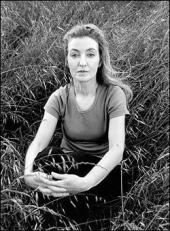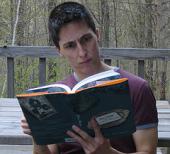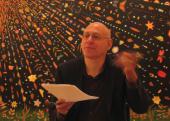Serendip is an independent site partnering with faculty at multiple colleges and universities around the world. Happy exploring!
Towards Day 9: "Every living being…has the right to…blossom"

Discussion Notes by EVD and maht91

I. mapmaking
* naming one another and signing-in
* today's notetakers: EVD and maht91
(talk about this task--have you found it useful/not?
writing up your own notes/making use of others'/
cf'ing two sets from the same day w/ one another/my notes??)
* few more comments re: more webpublishing and responding--
maht91 and rachelr: continued technical difficulties?
how has it been more generally?
reactions/feedback/pushback/satisfaction?
have you been reading one another's papers?
how about responding to one another?
reading my responses to one another's work?
(only Owl has responded to me....always an option)
* we finished up Rebecca Solnit on Thursday, though it looks as though she will linger as you think about the sort of education you want (and how to get it)--
maht91: people learn when they experience things they don't know .... we get lost in our thoughts and ideas ... when we get lost intellectually, is when we discover our strengths and weaknesses, what interests us and what does not.
kgould: my favorite kind of "getting lost" is probably in an intellectual pursuit. That moment where I don't know, where I can't make the connection, where my brain has to burn and tug and start spinning like a blender, is one of the most enjoyable feelings I get in the classroom.
SandraG: Getting found once you are in this position seems to be the harder action to complete.
veritatemdilexi: who dictates "lost"?
FatCatRex: changing of agency around place, that we are a part of place and it is a part of us, could really set us free to be lost .... if we assume geography is in control, then bring on the terra incognita.
smacholdt (& later veritatemdilexi) garnered a commentator's "two pence" (change the currency to suite your locale) on how our brains are mapping engines, constantly ... reducing complexity/viewing from afar, and how our knack for categorisation ... can lead us to consequences that are very dangerous ... the inaccuracy of our maps that enables us to see a global picture can also lead to disaster...
* for Thursday: read three more essays (of your own choosing) in The Ecology of Wisdom and come ready to do more of what we will start today: playing both the "believing" and the "doubting" games with Naess's ideas
* Thursday night, also consider attending the reading @ 7:30 in TGH by Jamaica Kincaid, author of a dozen works of fiction and nonfiction (possible texts for later in semester?)
* kgould also suggested Annie Dillard's Pilgrim @ Tinkercreek
II. Deep Ecology
Clearly, I selected this book to mark the "ultimate" point in a trajectory trending toward increasingly shared subjectivity: moving from Bechdel's personal memoir, through Solnit's historical meditation, we arrive now @ Naess's "program": a broad philosophical system for deep ecology (where the "point of view" --or @ least the center of values-- is not human, as TyL points out). Does this mark the "ultimate" in non-fiction??
to highlight that "objective," non human-centric position,
we begin today by paying attention to Naess's bullet points,
his "distilled norms, formulas, principles, slogans, mottoes, and outlines"
pp. 17-18
p. 28
p. 81
p. 111
pp. 140-141
let's go 'round, extracting from these lists
some bullet points of our own ....
What is deep ecology? How does it differ (or not?) from what
you have (heretofore) understood as thinking ecologically?
How does it differ from shallow ecology?
What has been added to you, by reading this book?
FatCatRex: reality is uncertain ... the real exists depending on preceding truths .... “fact” is an implied construction .... ecosophy is based on ‘facts’ or truths of our experiences ... [and so] vary person to person
smacholdt: “What a being will experience depends on its state.” (and her commentator: we can only EVER argue from our POV...)
What do you question?
smacholdt: I did not enjoy Gestalt Thinking and Buddhism as much because I was confused as to how the philosophies related to the ecology movement.
TyL: What strikes me about the book's tone in general is its entire unconcern for human beings .... the vast majority of humanity don't get the same consideration that animals do.
rachelr: I agree that often his concern for being efficient and "green" sometimes goes above what makes sense- for instance when ... he is talking about doing vigorous exercise for 5 minutes instead of heating up the rooms in his cottage ... "a person occupies less than 1 percent of the volume of a room. Why heat more than 99 percent just to heat that little volume?" .... but he is using up energy ... so he will have to eat more to maintain ... warmth.
 |
 |
 |
 |
III. Making up a panel--oh, hey! imagining a conversation:
What would Naess say to Shields about there being no originality?
cf. Shields w/ FatCatRex's report: Naess implies that at the very least, ownership of an idea or truth is unimportant .... Claiming truth only deprives others, which no one wants to do.
To Bechdel about her narrative focus on herself and her father?
What would his response be to Solnit's keynotes--
that "it is the nature of things to be lost," but that
(because of dreams, and art, and memory) "nothing is lost"?
FatCatRex: Both Naess and Solnit sincerely value place attachment and space identification
yet cf. Solnit's attitude toward going exploring beyond the known w/
FatCatRex: Naess says that “living our ecosophy is a deep, long-term commitment to our home place.”
rachelr: Naess speaks about "the development of a place in which a person feels at home....choose a place that you will likely to be able to master when you are older. Then, this is a place where you can live and die."
Discussion Notes by EVD and maht91


